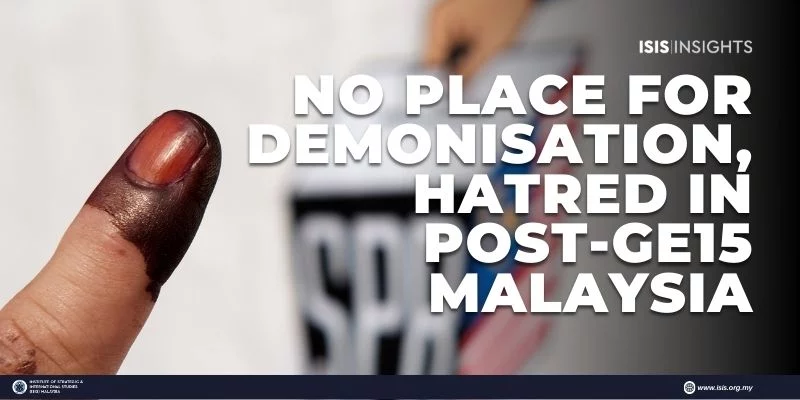Learn how to listen, interact with those of opposing views before nation is torn apart
By Nazran Zhafri & Zayana Zaikariah
THE results of the 15th general election might have disappointed some who deemed the outcome as “unfavourable”. Some reactions laced with racial overtones and insults on social media and WhatsApp groups were alarming and concerning.
There was a stark contrast in reaction from urban voters in comparison to GE14’s result, which was hailed as a “victory” for democracy while GE15 was a “dark day”. Voter turnout for GE15 was 74% – a success for any democratic country as a large number of voters made their voices heard. Some may see it as urban Malaysia wanting to have their cake and eat it, too, and only celebrating democracy when the results go their way.
The backlash showcased a worrying divisive trend in Malaysia. Those who voted for Perikatan Nasional were labelled as “brainwashed”, “insufficiently educated” or “extremist”. To fall back on these simplistic views leads to a demonisation and “otherisation” of these voters, and almost invalidating their opinions.
To illustrate further, the UNDI18 wave had overwhelming support just before the elections, but took a different turn when results indicated that youth votes swung more conservative more than expected. Suddenly, many questioned the youth vote.
Malaysians run the danger of warping our worldview if we consistently choose to reject individuals with opposing opinions when we should be open to discussing taboo topics. By excluding differing viewpoints, we could deprive ourselves the chance to understand a voter’s decision. How can we advocate for freedom of speech but shun those with whom we disagree? Further, while we must agree that racism should not be tolerated, to assume that supporters of certain parties share the same unpleasant stance as their candidates is also hazardous.
Further, vilification of voters from the east coast and the north is reminiscent of recent history in other parts of the world, which offer important lessons. In the United States, when Donald Trump pulled off a surprise in 2016, and in the United Kingdom, when “leave” won the Brexit referendum, many urban voters and opinion makers, who didn’t engage with rural and conservative voters, expressed a similar response, thereby creating further divides.
We must learn from these examples and to succeed, we must find a sense of comfort in living and engaging with those of different race, religion and economic status.
Although there is personal responsibility in changing how we view others with contradicting perspective to our own, the government needs to take greater responsibility playing its part. In 2021, the launching of the National Unity Policy provided numerous strategies and it is hoped that the new cabinet focuses on immediate implementation after careful review.
Constitutional literacy must also be a priority and instilled as early as primary education. Along with a stronger emphasis on critical analysis and discourse of ethnic issues in the curriculum based on content and history of the constitution to inspire youth to have a deeper sense of national unity and appreciation.
Strong emphasis in the curriculum must also be put on valuing Sabah and Sarawak. They can no longer be a distant thought to those in the peninsula. Through strong constitutional literacy, Malaysians will learn to appreciate the importance of multiculturalism to the country’s success.
Political parties must steer away from the heinous colonial tactic of “divide and rule”. There must be policies to deal with hate speech and politicians who reinforce stereotypes of race and religion. But it must be addressed in a delicate manner as simply charging anyone with making comments also runs the risk of creating martyrs and strengthening their support. Thus, alternative forms of remedies, such mediation, may provide a more pragmatic approach.
Policymakers and Malaysians are at a major crossroads, where we must determine what we can work on cooperatively as the new administration focuses on issues dealing with national unity. These will ultimately have long-term impacts on social and national cohesiveness.





